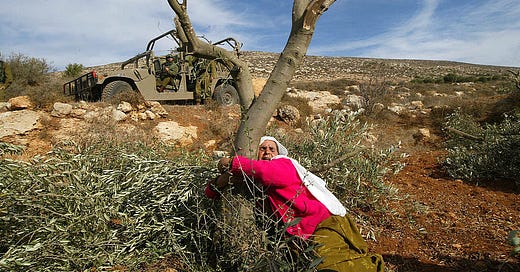I believe plant work is political. You will hear me say this time and again because I firmly believe that it is. The land is a mirror. It very clearly tells the story of how people live and have lived throughout time, tales of use and abuse, of war, of famine, of colonization, of neglect. Every plant we meet has a story too, maybe a little less readable upon first glance, but an equally sordid history of engagement with humans—again, in most recent history, tales of decimation and disregard. There are softer stories too, hidden beneath, from days when humans lived in reverence and reciprocity with the land. They are all there, between the lines in the botanical and herbal literature and what is plant work but shining a light?
I often think about the purpose behind what I do, why I am an herbalist, why it feels so important to me to teach people about plants. For me, it’s entirely about liberation. It feels very obvious—how we treat the land and the plants is reflective of how we treat each other and how we view ourselves within the social caste system of the world. When we start to see the interconnectedness of the beings that make up our ecosystem, we start to see the interconnectedness of our own lives, our stories, and our collective pursuits of freedom and the way those weave seamlessly with the water and earth. We start to see that both physical and ecological wellness are just paradoxes if they are not within everyone’s grasp.
“In the indigenous worldview, a healthy landscape is understood to be whole and generous enough to be able to sustain its partners. It engages land not as a machine but as a community of respected non-human persons to whom we have a responsibility,” writes Robin Wall Kimmerer in Braiding Sweetgrass. We have drifted so far from this perspective in the way we view both the land and the people we share it with, one in which wealth and security are not resources to be hoarded, where abundance and care are shared. Kimmerer also writes in her essay, The Serviceberry, about the value of the gift economy, describing it as a way of “organizing ourselves to sustain life.” In a gift economy, she writes, “all flourishing is mutual.”
Today I am thinking of Palestine. I am thinking of the 25,000+ people who have been killed by the governments of Israel and the United States in the last 108 days. I am thinking of the 62,000+ injured. The 30,000+ orphaned children (I think that number is actually even larger). These numbers are only growing. Today I am thinking of their lands, stolen and destroyed, in the name of Israeli sovereignty and the farce of American democracy and self-protection. I am thinking of their strawberry fields, their olive trees, their river, their sea and how the land will tell this story for many years to come, long after we are gone.
Another staggering figure from The Guardian: “the planet-warming emissions generated during the first two months of Israel’s bombardment of Gaza were greater than the annual carbon footprint of more than 20 of world’s most climate-vulnerable nations”—these emissions have quite certainly only increased, if not doubled.
One of the most profound pieces of research regarding plants that has emerged in recent years is the understanding that plants and trees do not compete for resources, which scientists once believed to be true. Forests are, in fact, socialist communities. Trees communicate with each other, share resources, self-sacrifice, heal one another, rear their children, rear others’ children, and keep one another alive in such slow and subtle ways it would take many human lifetimes to fully witness it all unfold. But we now know it, scientifically, to be true. The land is a gift economy that values all life over the individual. In the forest, whether there is abundance or scarcity, it is shared.
As a person who works with and teaches about plants for a living, I must express, again, my unabashed support for Palestine because their right to wellness, to land and plant connection, and self-determination is intrinsically linked to our own, and that’s what my whole life and business are centred around fighting for. And their access to all of these things, their existence, does not take away from ours. If we plant people are to truly embody the lessons we learn and share from the plant world, we must not view life and existence and the world as divided up into peoples in competition. Remember—all flourishing is mutual.
This week Foliage Botanics and I are on strike. The apothecary is closed. I am doing my best not to move money. Long ago I divested from big banks, but I am urging others to pull their money out and put it into small local credit unions. I am not supporting businesses that support or benefit from Israel. I have committed to calling each of my representatives every single day and to using my platform, albeit small, to uplift Palestinian voices, share about the genocide, and call others into consideration and action. If this is not on your mind now and until a ceasefire, I ask that it be.
Truly, we live with mysteries too marvelous
to be understood.
How grass can be nourishing in the
mouths of the lambs.
How rivers and stones are forever
in allegiance with gravity
while we ourselves dream of rising.
How two hands touch and the bonds will
never be broken.
How people come, from delight or the
scars of damage,
to the comfort of a poem.
Let me keep my distance, always, from those
who think they have the answers.
Let me keep company always with those who say
“Look!” and laugh in astonishment,
and bow their heads.
Mysteries, Yes by Mary Oliver






Beautifully written, as always. Thank you for this.